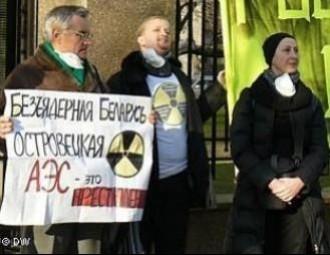Jailed Maksim Viniarski goes on hunger strike

A jailed Belarusan opposition activist started a hunger strike to protest his imprisonment. Meanwhile, Chernobyl pickets are banned across the country, and activists are put under preventive arrests.
Maksim Viniarski of the European Belarus movement was sentenced on April 22 to 12 days in jail for resisting police. He told RFE/RL that he believed the aim of his sentence is to isolate him during a commemoration event in Minsk for the victims of Chernobyl on April 26.
Viniarski said that before his release from jail earlier this month police had tried to persuade him to leave Minsk for a foreign county or a remote village, but he refused. Jail officers made it clear to him that he would be arrested again unless he stayed out of Minsk until May’s Ice Hockey World Championship was over.
Earlier Maksim Viniarski served a 15-day jail term for participating in a sanctioned 'Dzen Voli' (Freedom Day) demonstration that took place in Minsk on March 25 to mark the 96th anniversary of the proclamation of the independence of the 1918 Belarusan National Republic. As the “EuroBelarus” Information Service has earlier reported, activists of European Belarus civil campaign Maksim Viniarski, Siarhei Makoits, Alena Lazarchyk, Uladz Barodka and Leanid Kulakou were detained on March 25, 2014.
Let us recall that jail sentences has also been imposed on opposition activists Ilya Dabratvor. Judge Natallya Asipchyk of Zavodski District Court sentenced Mr Dabratvor to 10 days in jail, Belsat reports.
Ilya Dabratvor, an activist of opposition organizations Alternatyva and Razam, was arrested by police officers in Minsk on Tuesday evening while he was driving in his own car and eventually was charged him with disorderly conduct and disobeying police officers.
Meanwhile, Chernobyl pickets have been prohibited in Hrodna. Thus, city residents Vadzim Saranchukou and Mikola Lemianouski saw their applications to organize Chernobyl-related pickets on April 26 were turned down, Euroradio reports.
Lemianouski and Saranchukou say that they wanted to conduct their pickets in a place specially assigned by the City Executive Committee for such events. However, Hrodna authorities have not allowed such events for over 10 years. They are not going to complain about the actions of the City Executive Committee because it is clear that it will yield no result, Saranchukou noted.
-
03.01
-
07.10
-
22.09
-
17.08
-
12.08
-
30.09








































